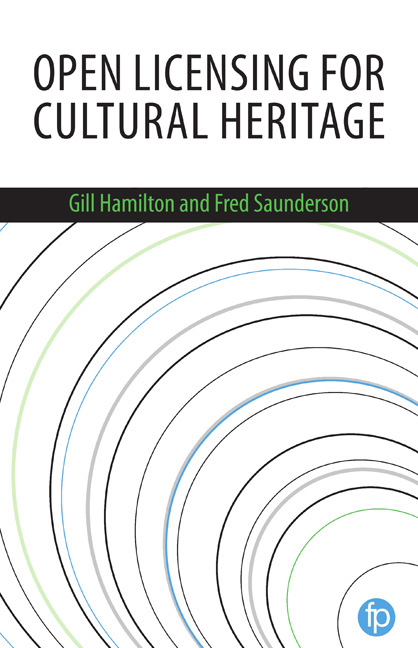Book contents
- Frontmatter
- Contents
- List of figures and tables
- Acknowledgements
- About the authors
- 1 Introduction
- 2 The open movement: its history and development
- 3 Copyright and licensing: a background
- 4 Open licensing: the logical option for cultural heritage
- Introduction to case studies
- 5 Small steps, big impact – how SMK became SMK Open
- 6 The British Library experience of open metadata licensing
- 7 Open policy and collaboration with Wikimedia at the National Library of Wales
- 8 Newcastle Libraries – the public library as a place to share culture
- 9 Developing open licensing at the National Library of Scotland
- 10 The Wellcome Library
- 11 Developing an open educational resources policy and open approaches to mitigate risk at University of Edinburgh
- 12 How to implement open licensing
- 13 Using and reusing openly licensed resources
- 14 Conclusion
- Index
8 - Newcastle Libraries – the public library as a place to share culture
Published online by Cambridge University Press: 08 June 2018
- Frontmatter
- Contents
- List of figures and tables
- Acknowledgements
- About the authors
- 1 Introduction
- 2 The open movement: its history and development
- 3 Copyright and licensing: a background
- 4 Open licensing: the logical option for cultural heritage
- Introduction to case studies
- 5 Small steps, big impact – how SMK became SMK Open
- 6 The British Library experience of open metadata licensing
- 7 Open policy and collaboration with Wikimedia at the National Library of Wales
- 8 Newcastle Libraries – the public library as a place to share culture
- 9 Developing open licensing at the National Library of Scotland
- 10 The Wellcome Library
- 11 Developing an open educational resources policy and open approaches to mitigate risk at University of Edinburgh
- 12 How to implement open licensing
- 13 Using and reusing openly licensed resources
- 14 Conclusion
- Index
Summary
Introduction
Newcastle Libraries are the public libraries serving the citizens of the City of Newcastle upon Tyne, UK. Newcastle is the biggest city in the North East of England and its library service, in particular the City Library, attracts users from across the region and beyond. The City Library houses the local studies and family history collections – this section also regularly receives requests and enquiries from overseas customers.
In the early 2000s a funded project allowed Newcastle Libraries to digitise a large part of its local history photographic collections and to publish them on a dedicated website called Tyneside Life and Times. However, a few years later the website encountered technical difficulties and the photographs were moved to the Flickr image hosting platform in June 2009. When the Flickr albums were created the images’ legal status appeared as the default copyright setting (Figure 8.1 on the next page). Download was originally disabled but this was changed early on, although this particular feature was never publicised. Apart from the Torday collection (1000 photographs of 1960s–1970s Newcastle), which was digitised by a volunteer and uploaded to a new album, the historic images collection on Flickr has only been extended ad hoc.
Commons Are Forever
In 2015 I started developing the project Commons Are Forever at Newcastle Libraries, with support from the Carnegie UK Trust's Library Lab programme. Commons Are Forever aimed to empower people by informing them of their rights to use and reuse works that are either in the public domain or available under an open licence, and encourage them in turn to share their creations with others. The project took the form of a series of events where members of the public were invited to create their own artworks in workshops facilitated by local artists, while learning about copyright and where to find free-to-use content.
A secondary goal of the project was to firmly re-position the library service as a place for the sharing of culture. Public libraries are traditionally making knowledge and culture accessible through loaning materials to members of the community, but I believe raising awareness of works that are out-of-copyright – in the public domain and belonging to all – or under open licences is also part of libraries’ role.
- Type
- Chapter
- Information
- Open Licensing for Cultural Heritage , pp. 133 - 136Publisher: FacetPrint publication year: 2017



